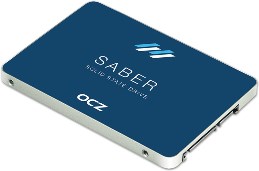
OCZ Storage Solutions ha annunciato i nuovi drive a stato solido, o SSD, appartenenti alla linea Saber 1000 che il noto vendor ha progettato per l'impiego in ambito aziendale.
Più in dettaglio, in accordo a OCZ, gli SSD Saber 1000 sono particolarmente indicati per Web Hosting, Virtual Desktop Infrastructure (VDI), Enterprise Content Management (ECM), Customer Relationship Management (CRM), Video-On Demand (VoD) e media streaming.
I nuovi drive a stato solido sono realizzati con chip di NAND flash a 19nm prodotti da Toshiba (questa organizzazione ora controlla la stessa OCZ Storage Solutions, ndr), gestiti a loro volta dal controller Barefoot 3, che è stato sviluppato dalla stessa OCZ. La linea Saber 1000 comprende al momento tre varianti che differiscono per la capacità di memorizzazione pari rispettivamente a 240GB, 480GB e 960GB.
Le prestazioni del drive SSD Saber 1000 da 960GB dichiarate dal costruttore sono le seguenti:
- 550MB/s in lettura sequenziale (con blocchi da 128KB);
- 470MB/s in scrittura sequenziale (con blocchi da 128KB);
- 98.000 IOPS in caso di letture random (con blocchi da 4KB);
- 20.000 IOPS in caso di scritture random (con blocchi da 4KB).

[Immagine ad alta risoluzione]

OCZ Storage Solutions -- a Toshiba Group Company and leading provider of high-performance solid-state drives (SSDs) for computing devices and systems, today announced its new enterprise-class Saber 1000 SSD Series designed for read-intensive applications targeting high-volume deployment hyperscale, web-hosting and distributed computing environments. The SATA-based Saber 1000 Series solves demanding key customer business challenges and supported by an enterprise-optimized feature-set, large storage capacities, and low total cost of ownership (TCO).
The new series leverages the latest A19nm NAND flash from Toshiba and is available in 240GB, 480GB and 960GB usable capacities. It utilizes OCZ's internally developed Barefoot 3 controller and firmware which delivers consistent sustained I/O performance across all capacities to accelerate enterprise applications.
"In hyperscale and distributed computing environments, a majority of the servers are performing high read activity tasks," said George Crump, Founder and Lead Analyst, Storage Switzerland. "For these read-intensive environments, an SSD, like OCZ's new Saber 1000 that provides high capacity, predictable performance and enterprise-level support - at favorable acquisition costs - is an ideal fit. This product provides an excellent opportunity for OCZ to expand its enterprise footprint into this evolving market segment."
"In designing the new Saber 1000 Series we listened to our customers to meet their growing needs for a server-class SSD that is optimized with the right balance of features, performance and cost," said Daryl Lang, CTO for OCZ Storage Solutions. "With the Saber 1000 Series, customers now have an ideal storage solution in which to build an all-flash datacenter, one that is able to efficiently process high volume enterprise and hyperscale workloads."
In a steady state condition by which the Saber 1000 Series 960GB drive is writing, erasing and re-writing data repeatedly over its full capacity, the performance for both large block sequential operations, as well as small block random operations, is at the top of its competitive class with specifications that include:
- 550 MB/s for sequential reads (128KB blocks);
- 470 MB/s for sequential writes (128KB blocks);
- 98,000 IOPS for random reads (4KB blocks); and
- 20,000 IOPS for random writes (4KB blocks)
The Saber 1000 Series is ideally suited for read-intensive applications such as read cache and indexing, Video-On Demand (VoD), Virtual Desktop Infrastructure (VDI), media streaming, front-end web server, cloud infrastructure, online archiving, Customer Relationship Management (CRM), and Enterprise Content Management (ECM), to name a few. Additionally, low 3.7 watts of power are typically consumed in an active state that helps to shrink datacenter energy needs while leading to additional savings due to reduced cooling requirements.
In the event of a sudden power loss, the Saber 1000 Series uses a technique referred to as Power Failure Management Plus (PFM+) which holds up the SSD circuitry long enough to ensure the integrity of the device so that it can be fully operational again once power is restored.
Monitoring and management is driven to new levels with OCZ's value added StoragePeak 1000 SSD Management System that enables IT managers to centrally monitor and administer connected Saber 1000 SSDs and other OCZ enterprise class solution resources from a web-based management interface. This network-accessible management system securely connects to multiple hosts (running Linux or Windows operating systems) providing a cross-platform view of the OCZ SSDs connected to servers, storage arrays or appliances, and includes a user configurable alerting systems that enables IT corrective actions to be initiated at an early stage.
News Source: OCZ Storage Solutions Press Release
Links
|

